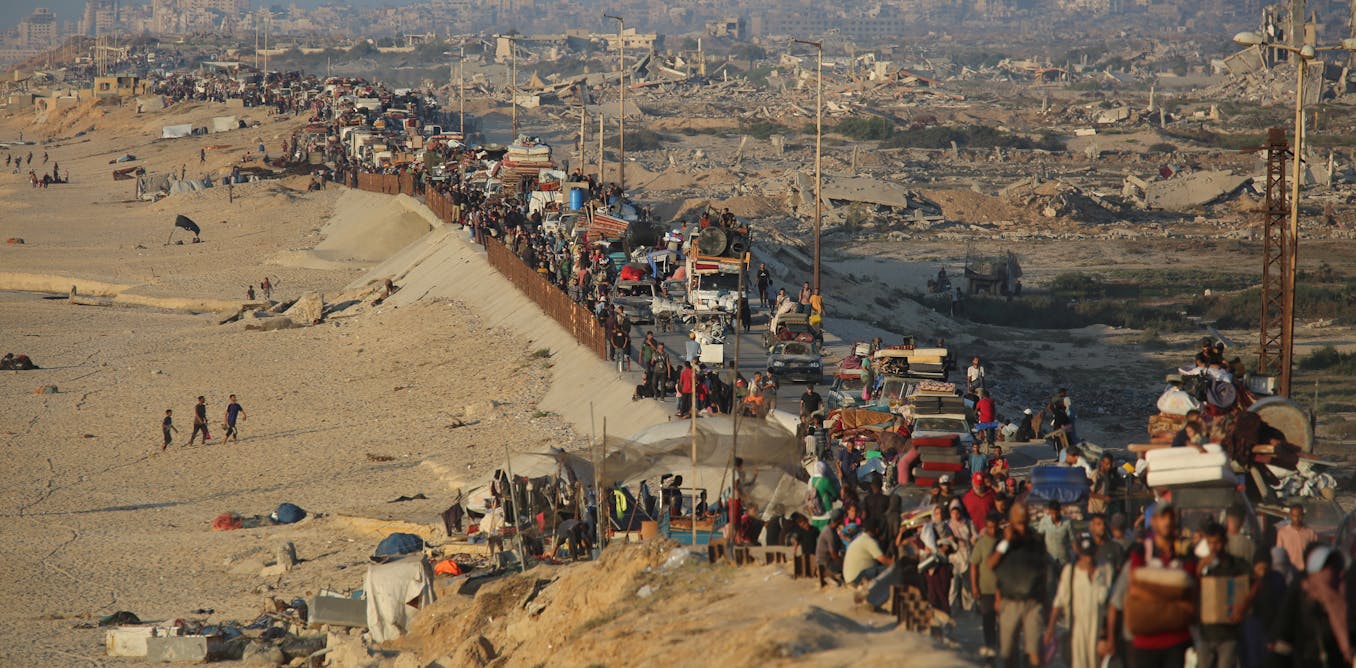Politics
UN Declares Genocide in Gaza, Pressures New Zealand on Palestine Recognition

The recent finding by a United Nations commission that Israel has committed genocide in Gaza places significant pressure on New Zealand to formally recognize a Palestinian state. As the humanitarian crisis in Gaza escalates, New Zealand’s government faces increasing calls, particularly from its Labour Party, to take a stronger stance against Israeli actions.
In response to what the Labour Party has termed the “unfolding genocide” in Gaza, there have been widespread pro-Palestinian protests across New Zealand. The Labour Party has indicated its support for imposing sanctions on Israel. This comes as other nations, including Australia, Canada, Belgium, and France, prepare to acknowledge Palestinian statehood at the upcoming UN General Assembly’s 80th session in New York. Currently, 147 member states recognize Palestine as a state.
The situation in New Zealand is critical, with many citizens advocating for a clear government stance. A recent poll indicates that approximately 42% of New Zealanders believe the government should recognize Palestine. Labour leader Chris Hipkins has criticized the government’s hesitance, stating, “If the government has decided to recognize Palestine, they should tell the New Zealand public that that’s what they are going to do.”
Legal Context and Historical Background
New Zealand’s obligations regarding genocide stem from its participation in the 1948 Genocide Convention, which mandates that signatory states take action to prevent and punish acts of genocide. The UN commission has suggested that New Zealand should consider joining South Africa’s case against Israel in the International Court of Justice.
Legal definitions of statehood complicate the recognition of Palestine. According to the Montevideo Convention of 1933, four criteria define statehood: a permanent population, a defined territory, a government, and the capacity to enter into relations with other states. Palestine meets three of these criteria, possessing a permanent population, recognized territory that includes Gaza and the West Bank, and diplomatic relations with other countries.
The primary contention lies in governance, as the Palestinian Authority’s control over its territory is questioned. Nonetheless, it is difficult to establish effective governance under conditions of occupation, as noted by the International Court of Justice.
Internationally, the question of Palestine’s statehood often arises in discussions of recognition. The “declarative” theory posits that meeting the Montevideo criteria alone establishes statehood. Conversely, the “constitutive” theory states that recognition by other states is essential. By either measure, Palestine has a compelling case for statehood, having declared independence in 1988 and joined various international organizations, including the Organisation of Islamic Cooperation and UNESCO.
Implications of Recognition
Despite its established status, Palestine is not a member of the United Nations. The UN Charter allows membership only for “peace-loving states” capable of fulfilling UN obligations, and Palestine’s bid for membership in 2011 was thwarted by the United States’ veto in the Security Council. As a result, a new attempt for recognition in 2025 would likely face similar challenges.
New Zealand’s Ministry of Foreign Affairs has maintained a policy of not making formal recognition of states, opting instead for “implied” recognition through various actions and policies. Should New Zealand choose to explicitly recognize Palestine at the UN next week, it would mark a significant shift in this long-standing approach.
Recognition would not resolve the ongoing occupation or the humanitarian crisis in Gaza, but it would affirm Palestine’s legal status as a state and align New Zealand with a majority of UN member states. As articulated by an Israeli commentator, such recognition would “re-establish the existence and the rights of Palestinians as individuals and as a collective.”
Furthermore, should New Zealand implement sanctions against Israel, it could draw upon the framework established by the Russia Sanctions Act 2022, which was introduced following the invasion of Ukraine. The deteriorating situation in Gaza underscores the urgency for meaningful change, and recognizing Palestine could represent a small yet significant step forward in New Zealand’s foreign policy.
The coming days will be pivotal as New Zealand prepares to announce its position amid increasing global calls for action. The decision will not only impact international relations but also reflect the sentiments of New Zealanders who are advocating for a more proactive role in addressing the humanitarian crisis in Palestine.
-

 World3 months ago
World3 months agoTest Your Knowledge: Take the Herald’s Afternoon Quiz Today
-

 Sports3 months ago
Sports3 months agoPM Faces Backlash from Fans During Netball Trophy Ceremony
-

 Lifestyle3 months ago
Lifestyle3 months agoDunedin Designers Win Top Award at Hokonui Fashion Event
-

 Sports3 months ago
Sports3 months agoLiam Lawson Launches New Era for Racing Bulls with Strong Start
-

 Lifestyle3 months ago
Lifestyle3 months agoDisney Fan Reveals Dress Code Tips for Park Visitors
-

 World4 months ago
World4 months agoCoalition Forms to Preserve Māori Wards in Hawke’s Bay
-

 Health3 months ago
Health3 months agoWalking Faster Offers Major Health Benefits for Older Adults
-

 Politics3 months ago
Politics3 months agoScots Rally with Humor and Music to Protest Trump’s Visit
-

 Top Stories4 months ago
Top Stories4 months agoUK and India Finalize Trade Deal to Boost Economic Ties
-

 Entertainment3 months ago
Entertainment3 months agoExperience the Excitement of ‘Chief of War’ in Oʻahu
-

 World4 months ago
World4 months agoHuntly Begins Water Pipe Flushing to Resolve Brown Water Issue
-

 Science4 months ago
Science4 months agoNew Interactive Map Reveals Wairarapa Valley’s Geological Secrets









